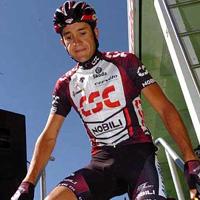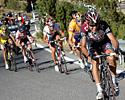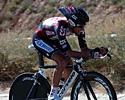
Recently on Cyclingnews.com |
An interview with Carlos Sastre, September 12, 2007
Bring on the racing

|
Carlos Sastre is the highest ranked Spaniard at his home Grand Tour, the Vuelta a España, currently holding fourth spot. Cyclingnews' Greg Johnson discovered how a new approach is fueling the Team CSC rider's Grand Tour ambitions.
Team CSC's Carlos Sastre is tackling the tough climbs of Spain's country side and crossing the finish line with a smile. It's all a part of the 32 year-old's new approach to taking on the world's biggest races. "When I say that I am passing it well, I mean I have taken this Tour different from previous races of these characteristics," he explained. "This time I have taken it with the intention to try to enjoy, to be more with the people, to gather the fruits of the fans' affection after so many years of work, to be thankful to them that they are lining the road and highways supporting us.
"I feel like a privileged person," he added. "I like my profession, I do not have a health problems, I have a team that supports me and I am fighting to try to be the best I can be in the Vuelta a España, that is the tour of my country."
It's this approach which has Sastre placed in a credible fourth place on general classification. It's this approach which Sastre hopes will earn him victory when the professional peloton reaches Madrid on September 23. "But that does not mean that I don't suffer," he added. "I am suffering like always, I am trying to fight as always and I am going to continue doing it until we arrive in Madrid."
"Until we arrive at Madrid there is nothing gained, nor nothing lost."-Carlos Sastre is ready to fight all the way to Madrid |
Currently sitting 3.02 minutes behind overall leader Denis Menchov (Rabobank), Sastre believes the 10 stages already run have had little impact on who will stand atop the rostrum in Madrid. "As I said at the beginning of the race, I believe that at this Vuelta a España there is not a single day in which you can be relaxed for a minute," he explained, referring to this year's route. "Perhaps there is no decisive stage, with a sufficient mountain so that great differences can be made, but [its length is] sufficient to make enough damage. Until we arrive at Madrid there is nothing gained, nor nothing lost.
"Before a race, when you have prepared conscientiously, one always awaits for the best thing and that happens being the leader or to be within a few seconds of the leadership," he added. "But the situation is what it is and I feel content [with what] I have done until now."
While Sastre lost over four minutes on Stage 8's Individual Time Trial, he says he was realistic when approaching the stage knowing that the parcours didn't play to his strengths. "I am not going to complain because I knew that it was there," he explained. "I know which are my virtues and which my defects. I know that the race against the clock is not my forté, especially of the characteristics of Zaragoza, and it has left me a little marked, but I feel very calm. [Lets see what happens] in this second part of the race."

|
The top ranked Spaniard in his home tour knows that Russian race leader Menchov is a strong rider and has a solid team supporting him in his Dutch Rabobank squad, but doesn't believe the rider has gained enough of a foothold yet to be ensured victory. "We have had three mountain stages and Menchov has demonstrated to be a solid leader on all terrains," confessed Sastre. "In addition one has seen that he counts on a team with very high potential to surround him and that also has served to fortify his position. But [that's] not made us lose the motivation."
Not only is Sastre still motivated after the first of the Vuelta's two rest days, he has complete confidence in his team-mates' dedication to the general classification standings. "[Menchov] is something that does not worry me," he revealed, when asked if he expected more help from other riders in the peloton. "I have the collaboration of all my team, it surrounds me and helps me at any moment and we [have] tried to follow our tactics 100 percent.
"I feel surrounded and wanted by my companions, that they completely support me and this is most important to me," added Sastre.
One thing the climber has been disappointed with at this year's Vuelta is the lack tough mountain stages. He expressed his desire to have a more challenging route to ensure diversity in the results. "Totally," he stated. "In the great tours, in any mountain stage, a very select group arrives at the finish and here we are seeing that a group arrives with 80 or 90 competitors which indicates that there is no sufficient hardness so that great differences can be made."

|
Sastre believes that if the terrain were more challenging that he and third placed Cadel Evans (Predictor-Lotto) would make a formidable combination in working together to topple Menchov. "I believe Cadel makes the race," responded Sastre when asked if having the Australian to help wear down the leader aids his efforts. "He is a competitor who perhaps does not have the mobility that I can have in the mountains, but holds it suffering and with much class. In another type of terrain, for example that which is lacking from the Vuelta, he is perhaps the suitable runner to collaborate with."
One collaboration which has failed to please Sastre, however, is that between Menchov and Italian Leonardo Piepoli (Saunier Duval - Prodir). After Monday's Stage 10 Sastre accused the race leader of 'buying' Piepoli's help, a claim supported by breakaway companion Manuel Beltrán (Liquigas). Despite a day of rest having passed since the incident, Sastre's position on the matter remains unchanged. "I continue thinking just like yesterday," he said of his feelings of Menchov's alleged deal to let Piepoli win the stage in return for his assistance in escaping over the stage's final kilometres. "I felt a great deception, because there are ways to make things and what Piepoli did didn't seem, to me, the most elegant. As I said when I arrived [at the finish], if Fernando Alonso had not spoken of the problems with his [Formula One car], we would know nothing.
"I believe I said what I had to say and it was a relief to me," he declared.
Sastre's strength and consistency cannot be questioned. His Grand Tour results speak for themselves; top five finishes in the Tour de France for the past two years, numerous podium stage finishes in both the Vuelta and the Tour. What the super-consistent Sastre is yet to prove however is his ability to go that further yard, to convert the swag of second and third spots into his first Grand Tour stage win and perhaps his first overall Grand Tour victory.
It's a step Sastre believes he's ready to take as the Veulta pushes on towards his birthplace of Madrid over the coming 11 stages. "I advise the people who follow [the race to continue watching] the screen of the television," he declared when asked if the Vuelta was already over.
